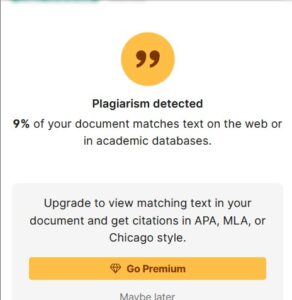 Can you imagine my surprise when Grammarly.com accused me of plagiarism? The charge was devastating. To assure we are on the same page, I turned to my favorite dictionary.
Can you imagine my surprise when Grammarly.com accused me of plagiarism? The charge was devastating. To assure we are on the same page, I turned to my favorite dictionary.
Plagiarize as defined by Merriam-Webster means:
: to steal and pass off (the ideas or words of another) as one’s own: use (another’s production) without crediting the source (transitive verb)
: to commit literary theft: present as new and original an idea or product derived from an existing source (intransitive verb)
Me? Steal others’ work? I was crushed.
THE PLAGIARISM ACCUSATION
While working on last week’s blog, Mousecapades 9 Wild Days, I dropped it into Grammarly to run a check. A warning popped up to let me know I had stolen 9% of my work. How could this be? No one else has had a mouse experience like my own.
After a bit of thinking, I re-ran Grammarly without the following information that has appeared at the end of other blogs:
In the event you missed my other run-ins with the frustrating rodents, you’ll find the links below.
Mousecapades: Marginalized Voices
Sign up on www.mariewatts.com to receive future Stories About Life delivered to your email address or read more stories by clicking here.
Now, thankfully, Grammarly’s Artificial Intelligence was satisfied that I had cleaned up my act.
Basically, I realized I was being called out for plagiarizing myself!
At our next writing group, I asked how I could plagiarize myself and was shocked to learn that it was indeed possible.
ACADEMIC PLAGIARISM
Unbeknownst to me, academia is concerned with various types of plagiarism. The University of North Texas has identified the most common types of plagiarism:
- “Direct Plagiarism is the word-for-word transcription of a section of someone else’s work, without attribution and without quotation marks.” This is also referred to as clone plagiarism.
- “Self-Plagiarism occurs when a student submits their previous work, or mixes parts of previous works, without permission from all professors involved. For example, it would be unacceptable to incorporate part of a term paper you wrote in high school into a paper assigned in a college course. Self-plagiarism also applies to submitting the same piece of work for assignments in different classes without previous permission from both professors.” This is also referred to as recycle plagiarism.
- “Mosaic Plagiarism occurs when a student borrows phrases from a source without using quotation marks or finds synonyms for the author’s language while keeping to the same general structure and meaning of the original.” This type of plagiarism is frequently called patchwriting and it most frequently occurs when students fail to paraphrase correctly. This is a combination of CTRL-C and Find-Replace.
- “Accidental Plagiarism occurs when a person neglects to cite their sources, or misquotes their sources, or unintentionally paraphrases a source by using similar words, groups of words, and/or sentence structure without attribution.” This is a combination of Hybrid, Mashup, Aggregator, and Re-Tweet plagiarism.
ho knew?
Here, it gets tricky. Not only are exact words to be given credit but ideas that are not yours must also be acknowledged.
LEGAL PLAGIARISM
The reality is that there are two ways plagiarism becomes illegal. One is copyright infringement. The other is breach of contract where the contract requires work to be original. Currently, criminal or civil prosecutions are uncommon.
While most academic plagiarism does not fall into the illegal category, it falls into an unethical one. You can, for instance, claim Shakespeare’s work as your own and not get sued because it is not copyright protected, but this is highly dishonest. You can suffer consequences by violating the ethical codes of the groups in which you operate.
PLAGIARISM FINAL THOUGHTS
My personal stance is to do the right thing by avoiding plagiarism even though not all of it is illegal. While it is lazy to pass an old blog off as a new one, I can do so because the only person who could sue me for copyright infringement is myself!
Go figure!
Sign up on www.mariewatts.com to receive future Stories About Life delivered to your email address or read more stories by clicking here.

Recent Comments